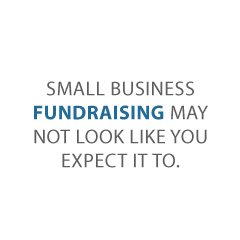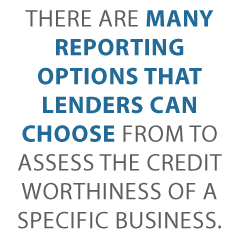Most people only think of loans when they think about funding a business. Financing is for sure the most common way to do it, but not all financing comes in the form a traditional term loan. Furthermore, there are options that are not even considered financing because you do not have to repay the funds. The truth is, small business fundraising may not look the way you expect it to.
Small Business Fundraising Can Happen in More Ways than You Thin
Small business fundraising can include loans, but it can also include investors, grants, and more. Beyond that, if you do go with financing of some sort, there are other options out there besides traditional banks and credit unions.
Demolish your funding problems with 27 killer ways to get cash for your business.
Small Business Fundraising: Loans
When you think of loans you probably think of traditional loans. These are the most popular, but they are not an option for everyone. There are other types as well.
Traditional Loans
These are loans from traditional banks and credit unions. As a business, your business credit score can help you get some types of funds even if your personal score isn’t awesome. That isn’t necessarily the case with this type of lending however.
With a traditional lender term loan, you are almost always going to have to give a personal guarantee. This means, personal credit will likely weigh heavy on their decision. If your personal credit score isn’t in order, you’ll probably have trouble.
How high does your credit score have to be? Typically, if you have at least a 750 you are in pretty good shape. Sometimes you can get approval with a score of 700+, but the terms will not be as favorable.
If you have awesome business credit, your lender might be more flexible. However, your personal credit score will still play a large role when it comes to terms and interest rate.
These are the most popular choice for small business fundraising because they typically have the best rates and terms. However, they are also the hardest to get.
SBA Loans
SBA loans are traditional bank loans, but they have a guarantee from the federal government. The Small Business Administration, works with lenders to offer small businesses financing solutions that owners may not be eligible for based on their own credit history. Because the government is offering a guarantee, lenders are able to be more flexible when it comes to the owner’s personal credit score.
In fact, it is possible to get an SBA microloan with a personal credit score between 620 and 640. These are very small loans, up to $50,000. They may also require personal collateral.
The trade-off with SBA loans is that the application process is lengthy. There is a ton of paperwork connected with these types of loans.
Here are some of the most popular SBA loan programs.
7(a) Loans
These are federally funded term loans up to $5 million. The funds can be used for expansion, purchasing equipment, working capital and more. Banks, credit unions, and other specialized institutions in partnership with the SBA process these loans and disburse the funds.
This is by far the most popular of the SBA loan programs, and the funds are available for a broad range of projects, from working capital to refinancing debt, and even buying a new business or real estate.
504 Loans
These loans are also available up to $5 million. Funds can buy machinery, facilities, or land. They are generally used for expansion, and private sector lenders or nonprofits process and disburse the money. They work well for commercial real estate purchases especially.
Microloans
Microloans are available in amounts up to $50,000. They work for starting a business, purchasing equipment, buying inventory, or for working capital. Community based nonprofits handle the administration of these programs as intermediaries. Unlike most other SBA loan programs, financing comes directly from the Small Business Administration.
Demolish your funding problems with 27 killer ways to get cash for your business.
SBA Express loans
These loans max out at $350,000. The turnaround for express loans is much faster, with the SBA taking up to 36 hours to give a decision. The application process is shorter also.
SBA CAPLine
There are 4 distinct CAPline programs. The main difference between each is the types of expenses they can fund. Each of them carries a maximum amount of $5 million and an interest rate that ranges from 7% to 10%. Funding can take 45 to 90 days.
The four different programs are:
Financing for businesses preparing for a seasonal increase in sales.
Financing for businesses that need funding to fill a contract.
Financing for businesses taking on a real estate or construction project.
Financing for businesses that are struggling with a short-term slump in sales.
SBA Community Advantage Loans
This is a pilot program set to either expire or extend in 2020. It’s designed to promote economic growth in underserved areas and markets. Those that make decisions about debt approval look over factors such as poor credit or low revenue if the business has the potential to stimulate the economy or create jobs in underserved areas.
Private Non-Traditional Loans
These are loans from lenders other than traditional banks and credit unions that offer terms loans. Usually they operate online. The difference between these and traditional lenders is that the loans have looser approval requirements and a much faster application process. Most often you can simply apply online, get approval in as little as 24 hours, and the funds are in your account within 24 to 48 hours after approval. Here are just a few options for this type of small business fundraising.
Funding Circle
If you are looking for a low APR, go with Funding Circle. They have fixed rate term loans and require a credit score of 620 or above. There is no minimum revenue requirement. However, they do require you to be in business for at least 2 years.
OnDeck
OnDeck offers lines of credit and term loans with fixed interest rates. You can get up to $500,000 with a term loan. The minimum FICO they require is 600. In addition, you must have $100,000 minimum annual revenue and be in business for at least one year.
Rapid Finance
With a large selection of financing products that includes term loans, Rapid Finance can be a great option for larger amounts. In addition to term loans, they offer bridge loans, healthcare cash advances, and lines of credit. Terms are from three to six months. Amounts range from $5,000 to $1,000,000. Unfortunately, they do not make their minimum credit score readily available. Still, you can use their quote tool. It will give you an idea of what you qualify for.
StreetShares
StreetShares offers invoice financing, term loans, and lines of credit. There is only a one year time in business requirement. Also, they require less minimum annual revenue than the others at only $25,000. The minimum credit score is 600.
Small Business Fundraising: Other Financing
In addition to term loans, there are other types of financing available for small business fundraising.
Lines of Credit
This is basically the traditional lender’s version of a business credit card. The credit is revolving. That means you only pay back what you use, just like a credit card. Rates are typically much better than a credit card however. The application and approval process is more similar to that of a traditional term loan than a credit card.
If you need revolving credit and can qualify for a term loan, this is the best of the available business money types for you. It is great for bridging cash gaps and covering short term expenses without the high credit card interest rates.
Unlike credit cards, there are no cash back rewards or loyalty points with a line of credit. As a result, some business owners prefer business credit cards despite typically higher rates.
Invoice Factoring
If you are an established business with accounts receivable, you have invoice factoring as an option. This is where the lender buys your outstanding invoices at a premium, and then collects the full amount themselves. You get cash right away, without waiting for your customers to pay the invoices.
This is a good option if you need cash fast, or if you do not qualify for other types of funds. The interest rate varies based on hold old the invoices are. A merchant cash advance is a similar option, in which a lender lends cash based on average daily credit card sales. Repayment is made daily credit card sales as well.
Small Business Fundraising: Crowdfunding
Crowdfunding is a newer option for finding investors. While the average Joe that wants to start a business needs funding, it is not always possible to find one or two large investors. With crowdfunding, you can literally have a “crowd” of investors fund your business $5 and $10 at the time.
There are many crowdfunding sites, but the most popular are Kickstarter and Indiegogo. The platforms are similar but there are some important differences. The most obvious is the timing of when you actually receive the funds that others invest in your company.
Kickstarter requires a preset goal, and you do not receive your funds until you reach your goal. For example, if you set a goal of $20,000 when you start your campaign, you will not receive any money that investors offer up until you reach that $20,000.
Indiegogo also requires a goal. In contrast to Kickstarter, they offer the option to receive funds as you go if you prefer. They also have an option called InDemand. This program allows you to continue raising funds after your original campaign is over without starting a whole new campaign. It is more of an extension of the first one.
There are other crowdfunding sites out there as well. Different ones work better for certain businesses and vendors. To determine which one you might have the most luck with, you will need to do some research. Keep in mind your type of business and the specific business each one appeals too.
Small Business Fundraising: Angel Investors
These are informal investors that generally invest at the start of a company. They typically receive equity in exchange.
Demolish your funding problems with 27 killer ways to get cash for your business.
Angel investing is risky. If a startup fails early on, investors will lose their investments completely. As a result, professionals will look for a defined exit strategy, acquisitions, or initial public offerings (IPOs).
The best way to find angel investors is to ask around. You can also try an angel investors website or network.
Small Business Fundraising: Grants
While grants are less commonly available than other options, they are more common that you probably think. Typically, they are offered by professional organizations. There are some government grants available also. There is stiff competition, but they are definitely worth a shot if you think you may qualify.
While requirements vary from grant to grant, and most are only awarded to a certain number of recipients, they are definitely worth exploring. This is especially true if you fall into one of these basic categories.
- Businesses run by veterans
- Businesses in low income areas
There are also some corporations that offer grants in a contest format that do not require much other than that you meet the corporation’s definition of a small business and win the contest.
Small Business Fundraising: Explore All Your Options
When you need to think about small business fundraising, be sure to consider all your options. It may be that traditional loans will work best for you, but that may not be the case at all. Even if you do qualify for loans, why not consider grants and investors as well. It’s free money. Any money you can get that will reduce the amount of debt you have to take on is a good thing.
If you want to expand your opportunities even further, work on the overall fundability of your business. There are things affecting it that you probably don’t even realize can make a difference. There is a lot more to it than just your credit score.
How you set up your business, your business phone number, and even past speeding tickets can indirectly affect fundability. If you work to reduce negative impact and increase positive impact on fundability, you can open the door to even more small business fundraising opportunities.
The post Small Business Fundraising: Let Me Count the Ways appeared first on Credit Suite.




